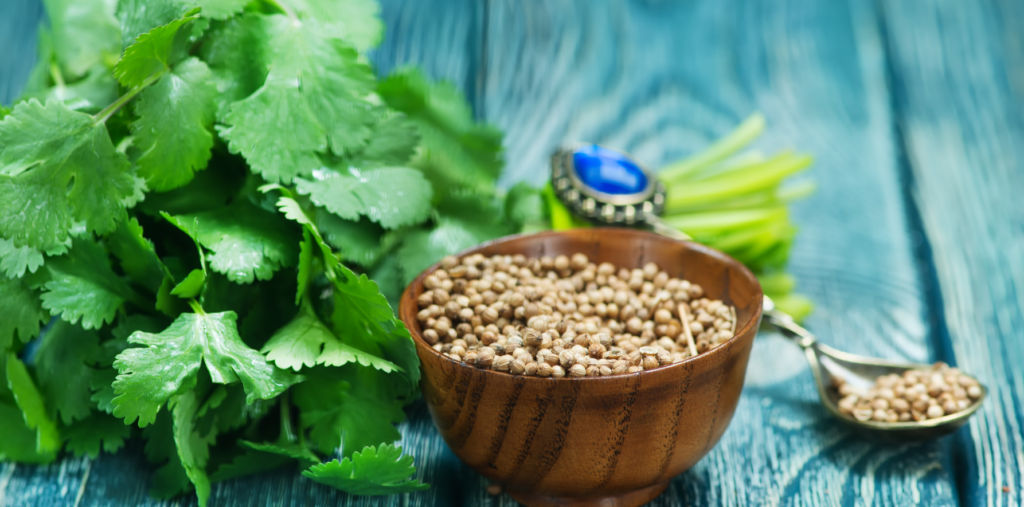Coriander offers a plethora of health benefits, making it more than just a flavourful herb. Some of its key advantages include:
- Rich in antioxidants: Coriander contains antioxidants which may help combat oxidative stress and reduce the risk of chronic diseases.
- Helps in Digestion: The essential oils in coriander seeds possess digestive properties that may help alleviate indigestion, bloating and gas.
- Anti-inflammatory properties: Coriander contains compounds like linalool and borneol, which exhibit anti-inflammatory effects, May help reduce inflammation in the body.
- Heart health: Coriander may help lower cholesterol levels and regulate blood pressure, promoting heart health and reducing the risk of cardiovascular diseases.

Coriander, also known as cilantro or Chinese parsley, is an aromatic herb native to regions spanning from Southern Europe to Western Asia. It holds a prominent place in various cuisines worldwide, including Indian, Middle Eastern, Latin American, and Southeast Asian cuisines. The entire plant is edible, with both the leaves (cilantro) and seeds commonly used in cooking. It features prominently in dishes such as curries, salsas, soups, salads, and marinades, imparting a fresh, citrusy flavour and vibrant green colour to the dish.
How to Consume Coriander:
Coriander can be consumed fresh or dried, with both the leaves and seeds offering distinct flavors and culinary applications. Fresh coriander leaves add a bright, citrusy flavor to salads, salsas, soups, and curries, while coriander seeds are commonly ground and used as a spice in various dishes and marinades. Additionally, coriander seeds can be steeped to make a flavorful tea or incorporated into spice blends for added depth of flavour.
Potential Adverse Effects and Precautions:
While coriander is generally safe for consumption, some individuals may experience allergic reactions or sensitivity to the herb. Additionally, consuming large quantities of coriander seeds may lead to stomach upset or gastrointestinal discomfort in some people. Individuals with known allergies to other plants in the Apiaceae family, such as celery or parsley, should exercise caution when consuming coriander.
Coriander is not just a culinary herb; it’s a powerhouse of flavor and nutrition with numerous health benefits to offer. From its antioxidant properties to its digestive benefits and anti-inflammatory effects, coriander is a valuable addition to any diet. Whether you sprinkle fresh cilantro leaves over your favorite dishes or grind coriander seeds to add depth to your recipes, incorporating this versatile herb into your culinary repertoire can enhance both the taste and nutritional value of your meals. So why not spice up your dishes and reap the rewards of coriander’s goodness today?

What is the difference between Coriander and Cilantro?
Let’s understand the difference between Cilantro and Coriander.
When it comes to cilantro vs coriander, it’s easy to get confused, but there’s a simple distinction. Cilantro refers to the fresh leaves and stems of the plant, while coriander refers to the seeds.
Cilantro is widely used in cooking, especially in Mexican, Indian and Thai cuisines, to add a fresh and citrusy flavour to dishes like salsa, curry, guacamole and many more. It’s bright green leaves are rich in vitamins and antioxidants, making it a healthy addition to your meals.
On the other hand, Coriander seeds are commonly used as a spice in various culinary traditions around the world. They have a warm, citrusy flavour with hints of earthiness and are often ground and used in spice blends, marinades, Curries and pickle recipes. Coriander seeds are known for their digestive properties and may help alleviate symptoms like bloating and indigestion.
Both cilantro and coriander offer distinct taste and benefits, making them versatile ingredients in the kitchen. Whether you’re garnishing a dish with fresh cilantro leaves or adding ground coriander seeds to a curry, these tasty and healthy herbs can increase nutritional value of your meals.
Health Benefits of Coriander Vs Cilantro
Health Benefits of Cilantro:
- Antioxidant Properties: Cilantro is rich in antioxidants like quercetin, kaempferol, and beta-carotene, which help combat oxidative stress and reduce inflammation in the body.
- Detoxification: Cilantro may aid in detoxifying heavy metals like lead, mercury, and aluminum from the body, potentially reducing the risk of heavy metal toxicity.
- Digestive Aid: The essential oils in cilantro leaves may help stimulate digestive enzymes, improving digestion and reducing bloating and discomfort.
- Freshens Breath: Cilantro contains compounds that may help combat bad breath and neutralise mouth odor.
Health Benefits of Coriander seeds:
- Digestive Health: Coriander seeds have been traditionally used to alleviate digestive issues such as bloating, gas, and indigestion.
- Cholesterol Management: Some studies suggest that coriander seeds may help lower LDL (bad) cholesterol levels and raise HDL (good) cholesterol levels, promoting heart health.
- Blood Sugar Regulation: Coriander seeds may help regulate blood sugar levels and improve
Choosing Coriander / Coriander Seeds
Appearance: Look for cilantro and coriander bunches that have vibrant, green leaves and firm stems. Avoid bunches with wilted or yellowing leaves, as this indicates they are past their prime.
Aroma: Both cilantro and coriander should have a fresh, citrusy aroma. Give a gentle sniff to ensure it has a pleasant scent, as strong or musty odors may indicate spoilage.
Stems: Check the stems of cilantro and coriander for signs of moisture or rot. Healthy stems should be firm and free from any sliminess or discoloration.
Storing Coriander / Coriander Seeds
Storing cilantro and coriander properly is essential to maintain their freshness and flavour for as long as possible. Here are some effective methods for storing cilantro and coriander:
When storing coriander seeds it’s important to keep them in an airtight container to preserve their flavour and aroma. Store the container in a cool, dark place, such as a pantry or spice cabinet, to protect the seeds from exposure to light and moisture. This helps prevent them from losing their flavour and becoming stale too quickly.
Simply wrap the cilantro loosely in a damp paper towel to help retain moisture. Place the wrapped bunch in a resealable plastic bag and store it in the vegetable drawer of your refrigerator. The damp paper towel acts as a barrier against wilting and helps maintain the herbs’ freshness for longer periods.
Trim the ends of the Cilantro stems and placing the bunch in a jar or glass of water
By following these simple storage methods, you can ensure that your cilantro and coriander stay fresh and flavorful for use in your favorite recipes. Whether you’re garnishing a dish with fresh cilantro leaves or adding ground coriander seeds to a spice blend, properly storing these herbs will help you maximize their taste and nutritional benefits.
Are there any substitutes for coriander / Cilantro?
Are you allergic to Coriander/ Cilantro? Here are few substitutes for coriander and cilantro that can be essential for individuals who may have allergies or don’t enjoy their distinctive taste.
Cumin:
- Cumin is a spice with a warm, earthy flavour and a subtle hint of citrus.
- While it’s not an exact substitute for coriander or cilantro, ground cumin can add depth and complexity to dishes where coriander seeds or ground coriander are typically used.
Basil:
- Basil offers sweet and slightly peppery flavour with hints of mint and clove.
- It can be used as a substitute for both coriander and cilantro in certain recipes, particularly in Italian and Mediterranean cuisines.
- Fresh basil leaves add brightness to dishes and pair well with tomatoes, pasta, and salads.
Parsley:
- Parsley is a popular herb with a fresh, slightly peppery taste.
- It works well as a substitute for cilantro in dishes where the fresh herb is used primarily for garnishing.
- Parsley is milder than cilantro, so you may need to use a larger quantity to achieve a similar flavor impact.
Celery Leaves:
- Celery leaves offer a mild, slightly bitter flavor that can complement a variety of dishes.
- They work well as a substitute for cilantro in recipes where a fresh, herbaceous flavor is desired.
- Chop celery leaves finely and use them as a garnish or incorporate them into salads, soups, and stews.
.
Dill:
- Dill has a unique flavour profile that is slightly sweet, tangy and aromatic.
- It works well as a substitute for coriander in recipes that call for the herb’s distinctive flavour, such as pickling or seasoning fish and seafood dishes.
- Dill can also be used as a substitute for cilantro in salads, dressings and dips, providing a fresh and herbaceous taste.
Tarragon:
- Tarragon has a distinctively bold and slightly bitter flavor with hints of licorice and vanilla.
- While it may not perfectly mimic the taste of coriander or cilantro, tarragon can add complexity and depth to dishes that call for these herbs.
- Use tarragon sparingly as a substitute, as its flavor can be quite potent.
Steps to follow if you have allergic reactions to cilantro/ coriander
If you’re experiencing an allergic reaction to cilantro or coriander, it’s essential to take prompt action to address the symptoms and seek medical attention if necessary. Here are some steps to follow if you suspect you’re having an allergic reaction:
1. Identify Symptoms: Allergic reactions to cilantro or coriander can vary in severity and may include symptoms such as:
- Itching or tingling sensation in the mouth or throat
- Swelling of the lips, tongue or throat
- Hives, rash or redness of the skin
- Difficulty breathing or wheezing
- Nausea, vomiting or diarrhea
- Dizziness or lightheadedness
2. Stop Consumption: If you suspect you’re having an allergic reaction to cilantro or coriander, stop consuming any dishes or products containing these ingredients immediately.
3. Rinse Mouth: Rinse your mouth with water to help remove any traces of cilantro or coriander from your mouth and reduce irritation.
4. Seek Medical Help: If your allergic reaction is severe or if you’re experiencing symptoms such as difficulty breathing, swelling of the throat, or a drop in blood pressure, seek emergency medical attention immediately. Call your local emergency services or go to the nearest hospital emergency room for evaluation and treatment.
5. Follow Up with Healthcare Provider: After receiving treatment for your allergic reaction, follow up with your healthcare provider to discuss your symptoms, review your medical history, and determine if any further evaluation or management is necessary. Your healthcare provider may recommend allergy testing or refer you to an allergist for further evaluation and management.
It’s important to take allergic reactions to cilantro or coriander seriously and seek appropriate medical care if needed. Avoidance of these ingredients and other related foods is the primary method of preventing allergic reactions in individuals with known allergies.
